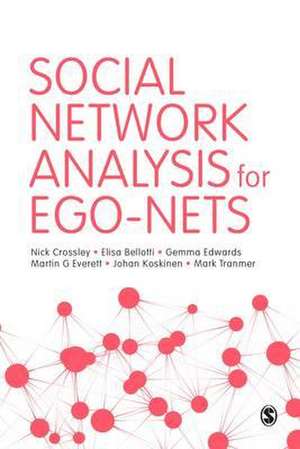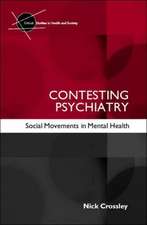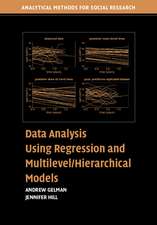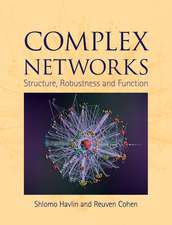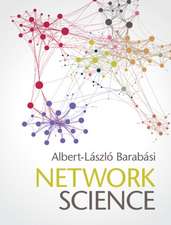Social Network Analysis for Ego-Nets
Autor Nick Crossley, Elisa Bellotti, Gemma Edwards, Martin G. Everett, Johan Henrik Koskinen, Mark Tranmeren Limba Engleză Paperback – 9 aug 2015
It starts with the basics, assuming no prior knowledge of social network analysis, but then moves on to introduce cutting edge innovations, covering both new statistical approaches to ego-net analysis and also the most recent thinking on mixing methods (quantitative and qualitative) to achieve depth and rigour. It is an absolute must for anybody wishing to explore the importance of networks.
| Toate formatele și edițiile | Preț | Express |
|---|---|---|
| Paperback (1) | 340.73 lei 3-5 săpt. | +19.22 lei 5-11 zile |
| SAGE Publications – 9 aug 2015 | 340.73 lei 3-5 săpt. | +19.22 lei 5-11 zile |
| Hardback (1) | 962.18 lei 6-8 săpt. | |
| SAGE Publications – 9 aug 2015 | 962.18 lei 6-8 săpt. |
Preț: 340.73 lei
Nou
65.21€ • 67.83$ • 53.83£
Carte disponibilă
Livrare economică 24 martie-07 aprilie
Livrare express 08-14 martie pentru 29.21 lei
Specificații
ISBN-10: 1446267776
Pagini: 208
Dimensiuni: 156 x 234 x 15 mm
Greutate: 0.32 kg
Ediția:1
Editura: SAGE Publications
Colecția Sage Publications Ltd
Locul publicării:London, United Kingdom
Recenzii
Cuprins
Chapter 1: Introduction
Chapter 2: Social Capital and Small Worlds - A Primer
Chapter 3: Getting Ego-Nets
Chapter 4: Analysing Ego-Net Data
Chapter 5: Narratives, Typologies and Case Studies
Chapter 6: Multilevel Models for Cross-Sectional Ego-Nets
Chapter 7: Statistical Analysis of Network Dynamics
Descriere
The ego-net approach to social network analysis, which takes discrete individual actors and their contacts as its starting point, is one of the most widely used approaches in the field. This is the first textbook to take readers through each stage of ego-net research, from conception, through research design and data gathering to analysis.
It starts with the basics, assuming no prior knowledge of social network analysis, but then moves on to introduce cutting edge innovations, covering both new statistical approaches to ego-net analysis and also the most recent thinking on mixing methods (quantitative and qualitative) to achieve depth and rigour. It is an absolute must for anybody wishing to explore the importance of networks.
